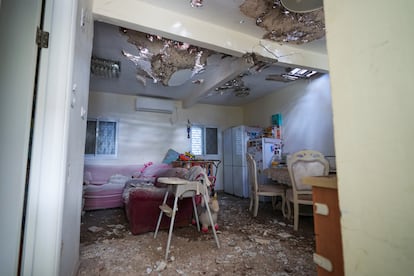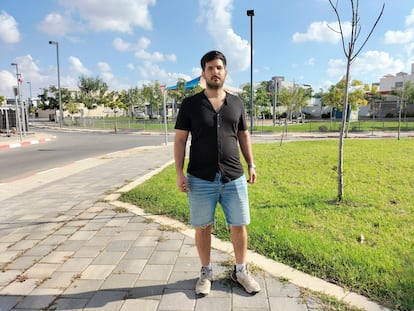Hundreds of Israelis refuse to leave evacuated cities: ‘I want to stay, but I know I should leave’
A minority of citizens are staying put in their homes near Gaza, despite fear of a new attack and the insistence of the authorities

Muli Asido walks his pit bull through the empty streets of Sderot, an Israeli city one kilometer (0.62 mi) from the Gaza Strip which, until the massive attack by Hamas on October 7, had a population of about 32,000. Right now, it seems almost like a ghost town. All the gas stations, supermarkets, restaurants and cafes are closed. Asido is not in a rush. He works in audiovisual animation, and these days civilian workplaces are functioning at half speed in a country focused on war. But his daily route has changed. “Now I choose the streets where I know where there is a shelter nearby or a good corner to duck down if the [rocket] sirens go off,” he says while Israeli air raids against the Strip echo in the background.
He is one of the last residents remaining in Sderot, one of about 2,000 people who have decided to stay, according to an estimate by City Council spokesperson Yaron Sasson. About two thirds of the population left after armed groups killed around 70 people in Sderot, most of them civilians, and even took over the police station. The police fled when they found themselves outnumbered and the station was demolished the next day, with the last militiamen inside. A video shows how they arrived in vans or on foot to open fire on the few pedestrians there were out (it was early in the morning) or those waiting for the bus. On the streets there are still burned-out vehicles and cars with broken windows.
Almost all the residents of Sderot left by October 15. The government, supported by private donations (many of them coming from abroad), chartered buses to take people to free hotels in Tel Aviv and Jerusalem and, above all, to Eilat, a tourist city on the shores of the Red Sea. “We contacted the residents to tell them that we strongly recommended that they leave, but it is not mandatory, so we cannot force them. They have the right to stay,” explains Sasson. A few miles away, an unprecedented deployment of troops, armored vehicles and military logistics vehicles awaits the order to enter Gaza, something that would foreseeably increase the launch of rockets.
Sderot suffered less than 20 other border towns, as well as kibbutzim, in which Hamas killed and kidnapped up to 20% of the population. These locations were completely evacuated shortly after the attack. Sderot, on the other hand, is part of a voluntary “refreshment” program, as the Ministry of Defense euphemistically calls it.
“I don’t really know why I’m staying. I think it’s because I want to take the time to think about where I want to go. Or because I don’t want to feel like I’m leaving the house abandoned, that I’m neglecting it,” says Asido, 33. Then, after a long pause, he adds: “Actually, I want to stay, but I know and feel I should leave.”

He was living by himself, but his house faces Gaza, so he returned to his parents’ house and placed a knife and a hammer at the entrance. “And there is my pit bull, although she is very friendly, she doesn’t do anything,” he clarifies. In this residential neighborhood, he looks out at night and figures, based on the number of lit windows, how many people have stayed in the city. “I see fewer and fewer. There is, at most, one per block.” He travels for groceries to Ashkelon, nine miles (15 km) to the north, a city where there have been rocket strikes in recent days. “There isn’t much to buy here. Bread, eggs, milk… it’s hard to get the rest.”
In reality, there is only one store open in Sderot to stock up on the most basic products. It is a small business in the center of town with shelves full of cans, bread and a lot of tobacco. Its owner, Mark, 46, asks everyone who crosses the threshold if they want Turkish coffee, either straight or with dash of milk. It’s a gift. “I’m not going to lie to you, of course I’m scared. Nobody wants to die. But this is the little I know and can do for the people here, whom I have known all my life. How can I leave now?” he asks. One of these people is Eli Attias, a 51-year-old taxi driver who no longer turns on the meter when he takes passengers. He says he is staying because his house contains “the memories of a lifetime” and because he thinks it would be impossible “for what happened to happen again.” As for the rockets, “One gets used to it.”
The store, which largely attracts people who are wandering around or asking for money, contributes to the overall image of desolation. Time seems to have stopped on the day of the attack. It was the last day of the Jewish holiday of Sukkot (that is why Hamas chose it, just like Syria and Egypt did 50 years earlier with Yom Kippur), so some of the tabernacles that are set up on those dates are still standing. There are campaign posters for local elections that were going to be held on October 31 but have been postponed to January 2024.
No women or children are to be seen, except for one pregnant woman who walked into the store with her husband, visibly agitated. They left the day of the attack and have returned only to collect some documents. They buy a large bottle of water and rush into the car back to Tel Aviv.
In a deeply nationalist country like Israel (particularly these days, when it has mobilized more than 300,000 reservists for its “mighty vengeance” in Gaza, as Prime Minister Benjamin Netanyahu defined it), Elinor opens her gas station by herself every day to help the soldiers, who are practically her only clients these days. It is the only gas station operating for several miles around, and it is located at the gates of Netivot, a city where today very few of its more than 40,000 inhabitants remain. It was here that Hamas was repelled: as the city is a little further away, some 6.8 miles (11 km) from Gaza, news of the attack had already reached here.
Elinor explains that it took her a week before she could build up the courage to leave the house. That’s almost as long as it took Israeli security forces to confirm that no armed Palestinians were roaming the area. The 42-year-old mother of two was getting ready to go to Tel Aviv or the United States, where she has relatives. “But on the first day I found the strength to go out on the street, I went to the gas station to check the fuel levels in the computer system, which cannot be seen from home. I didn’t do it with the idea of reopening, but just to see if something had happened. Then I saw so many soldiers and how they needed a cup of coffee that I said to myself: ‘Even if I’m really scared, I have to open a little every day, to serve them.’
Every morning she raises the blinds, works for a few hours and closes before dark, out of fear. She gives out a free cup of coffee to every soldier who walks in. It’s the new policy of the commercial chain to which the station belongs, Joe. The rest of the customers pay. Elinor used to work shifts with five other employees, four of them Jewish and one Palestinian. Now she is the only one left. “Everyone is afraid. And I don’t blame them.”
Sign up for our weekly newsletter to get more English-language news coverage from EL PAÍS USA Edition
Tu suscripción se está usando en otro dispositivo
¿Quieres añadir otro usuario a tu suscripción?
Si continúas leyendo en este dispositivo, no se podrá leer en el otro.
FlechaTu suscripción se está usando en otro dispositivo y solo puedes acceder a EL PAÍS desde un dispositivo a la vez.
Si quieres compartir tu cuenta, cambia tu suscripción a la modalidad Premium, así podrás añadir otro usuario. Cada uno accederá con su propia cuenta de email, lo que os permitirá personalizar vuestra experiencia en EL PAÍS.
¿Tienes una suscripción de empresa? Accede aquí para contratar más cuentas.
En el caso de no saber quién está usando tu cuenta, te recomendamos cambiar tu contraseña aquí.
Si decides continuar compartiendo tu cuenta, este mensaje se mostrará en tu dispositivo y en el de la otra persona que está usando tu cuenta de forma indefinida, afectando a tu experiencia de lectura. Puedes consultar aquí los términos y condiciones de la suscripción digital.









































